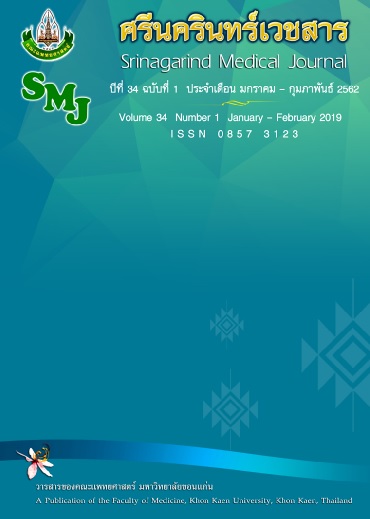Impact of Smartphone and Tablet Use on Health and Academic Performance of Pharmacy Students at Srinakharinwirot University
Keywords:
smartphone; tablet; health; academic performance; pharmacy studentAbstract
Background and Objectives: The survey of Thailand internet use profile 2016 found that generation Y (18-37 years old) was the most internet overusers and smartphone was the most popular digital devices. Lifestyle of smartphone overusers might affect their health and academic performance in young adults. This study aimed to investigate the impact of smartphone and tablet use on health and academic performance of pharmacy students at Srinakharinwirot University.
Methods: A cross-sectional descriptive study was performed in all pharmacy students enrolled in the academic year 2017. Data was collected by research questionnaire including general characteristics, the smartphone and tablet use modified from Smartphone Addiction Scale-Short Version (SAS-SV), physical health data developed by researchers and mental health data evaluated by Center for Epidemiologic Studies Depression Scale (CES-D) Thai version for depression test and Suanprung Stress Test -20 for stress test.
Results: Three hundred and ninety-one of pharmacy students voluntarily participated in the study. Most of them were female with mean age 21.6 years old. 75.5% of them used only smartphone. Duration and frequency of smartphone and/or tablet use were 3-4 hours per day and 11-20 times per day, respectively. Smartphone and/or tablet addiction was indicated to 39.1% of total. Physical health data showed that most participants (70.1%) were “normal health” measured in term of the total physical health. For considering physical health data by each category, it found that most participants were “beginning of physical health problem” in the daily life and the memory and concentration categories. Mental health data revealed 32.5% of depression, 41.4% of moderate stress and 38.6% of high stress. Smartphone and/or tablet addiction showed statistically significant effect on the total physical health, the vision health, the hearing health, the memory and concentration and the sickness categories (p ≤ 0.05). Moreover, smartphone and/or tablet addiction had significant impact on depression and stress (p ≤ 0.05). However, it had no effect on academic performance.
Conclusion: Smartphone and/or tablet addiction had significant impact on the total physical health and mental health and still no effect on academic performance in pharmacy students at Srinakharinwirot University.
References
2. Chatterjee C. 3 reasons not to sleep with your phone in the bed [Internet]. 2014 [cited Dec 12, 2016]. Available from: http://abcnews.go.com/Health/reasons-sleep-phone-bed/story?id=24839804.
3. Thomée S, Härenstam A, Hagberg M. Mobile phone use and stress, sleep disturbances, and symptoms of depression among young adults - a prospective cohort study. BMC Public Health 2011; 11: 1-11.
4. Hwang KH, Yoo YS, Cho OH. Smartphone overuse and upper extremity pain, anxiety, depression and interpersonal relationships among college students. Korea Constent Assoc 2012; 12: 365-75.
5. Intolo P, Sirininlakul N, Saksanit N, Kongdontree P, Thuwatorn P. pain and muscle activity of neck, shoulder, upper back and arm during smartphone use in women aged 18-25 years old. J Health Syst Res 2016; 10: 351-60.
6. Aggarwal K. Twenty-six percent doctors suffer from severe mobile phone-induced anxiety: excessive use of mobile phone can be injurious to your health. Indian J Clin Pract 2013; 24: 7–9.
7. Szyjkowska A, Gadzicka E, Szymczak W, Bortkiewicz A. The risk of subjective symptoms in mobile phone users in Poland-an epidemiological study. Int J Occup Med Environ Health 2014; 27: 293-303.
8. World Health Organization. What are the health risks associated with mobile phones and their base stations [Internet]. 2013 [cited Oct 3, 2016]. Available from: http://www.who.int/features/qa/30/en/.
9. Electromagnetic health. WHO/IARC classifies radiofrequency electromagnetic fields as possibly carcinogenic to humans [Internet]. 2011 [cited Oct 3, 2016]. Available from: http://electromagnetichealth.org/electromagnetic-health-blog/iarc-rf-carc/.
10. Kovach C. World Health Organization: cell phones may cause cancer [Internet]. 2016 [cited Oct 3, 2016]. Available from: http://www.businessinsider.com/cell-phones-cause-cancer-2011-5.
11. Kwon M, Kim DJ, Cho H, Yang S. The smartphone addiction scale: development and validation of a short version for adolescents. PLoS ONE 2013; 8: e83558.
12. Ruangtrakool S. Depression and suicide. Bangkok: Ruenkaew Printing, 2000.
13. Phattharayuttawat S. Manual of psychological testing. 3rd edition. Bangkok: Medical Media Co.Ltd, 2005.
14. Mahatnirunkul S, Pumpaisanchai W, Tapanya P. Research report: the construction of Suanprung Stress Test. Chiangmai: Suanprung Psychiatric Hospital, 1997.
15. Lee M, Hong Y, Lee S, Won J, Yang J, Park S, et al. The effects of smartphone use on upper extremity muscle activity and pain threshold. J Phys Ther Sci 2015; 27: 1743-5.
16. Matar boumosleh J, Jaalouk D. Depression, anxiety, and smartphone addiction in university students-a cross sectional study. PLoS ONE 2017; 12: e0182239.
17. Babadi-akashe Z, Zamani BE, Abedini Y, Akbari H, Hedayati N. The relationship between mental health and addiction to mobile phones among university students of Shahrekord, Iran. Addict Health 2014; 6: 93-9.
18. Samaha M, Hawi NS. Relationships among smartphone addiction, stress, academic performance, and satisfaction with life. Comput Human Behav 2016; 57: 321-5.




